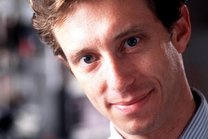Oral history interview with David Ron
- 1998-Dec-07 – 1998-Dec-09
David Ron was born in Ein Carmel, a kibbutz near Haifa, Israel. The kibbutz provided room and board for the family while Ron's parents were studying at the Technion-Israel Institute of Technology, his mother chemistry and his father physics. While Ron was still a young child, his parents joined the faculty at the Technion, and the family moved to Haifa, where David mostly grew up. When he was about six his parents took postdocs, and the family, now including David and two sisters, moved to Princeton University. After two years there they spent a year at University of California, San Diego, and then went back to the Technion. When David was in junior high school the family again spent a year in the United States, this time at the University of California, Los Angeles. David chose the mathematics-chemistry-physics track in high school, the most difficult. School was intended to be "a grind"; learning was not an end in itself, simply a means. Family dinner discussions centered on politics; David says there was not much "fun stuff" in his household. He liked to read, especially history; he was not much interested in sports. The family was strongly atheistic, despite the extreme Orthodoxy and Zionism that brought many of his ancestors to Israel from mostly Eastern Europe, so David was not even Bar Mitzvah. After finishing high school at seventeen, David entered medical school. He had to make an arrangement with the army to do his compulsory service after college; this meant promising summer boot camps and five years of service after graduation. He spent part of his third summer working in Avraham Hershko's lab, where he learned about protein degradation. The experience discouraged him from bench science; and he spent the following summers at Hammersmith Hospital in London, where he did rotations in endocrinology, neurology, and hematology. He returned to the Technion for a year, after which he went into the army for five years. He was a medic assigned to the Golan Heights during a war with Lebanon; soldiers there suffered crash injuries, and Ron published a paper on forced bicarbonate infusion as a treatment for renal failure. He then did his residency in internal medicine at Mount Sinai Medical Center in New York City and decided he wanted to do bench science as well. He chose endocrinology because it afforded him more time for the bench. He accepted a fellowship at Massachusetts General Hospital, working in Joel Habener's lab. There Ron became interested in possible genetic regulation of responses to stresses on the endoplasmic reticulum. He has discovered that CHOP (CIEBP homologous protein), which can be a marker of endoplasmic reticulum stresses, is induced in some disease states, like Crohn's disease. He is trying to discover where that information leads him. Ron accepted an assistant professorship at the Skirball Institute for Biomolecular Medicine at New York University, where he continues his research into CHOP and the IRE-1beta gene. He has won a number of awards, including the Pew Scholars in the Biomedical Sciences award and an award from the Leukemia Society of America. He and his wife, who is also a scientist and who works at the Population Center, have found a way to balance their professional lives with their life at home with their son.
Access this interview
By request 1 PDF Transcript File and 12 Audio Recording Files
Fill out a brief form to receive immediate access to these files.
If you have any questions about transcripts, recordings, or usage permissions, contact the Center for Oral History at oralhistory@sciencehistory.org.









